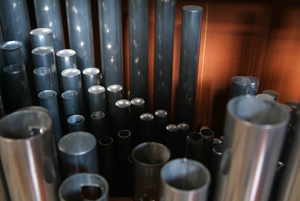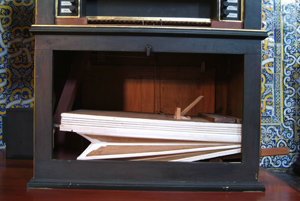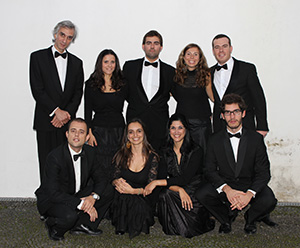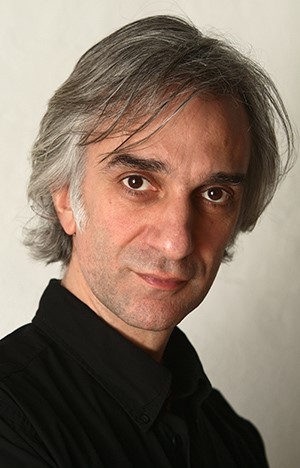 Monday, 28 October, 9.30, p.m.
Monday, 28 October, 9.30, p.m.
Church and Convent of Santa Clara
Capella Patriarchal:
Mónica Santos, Patrycja Gabrel, sopranos
Carolina Figueiredo, Catarina Saraiva, alto
João Sebastião, Pedro Cachado, tenors
Manuel Rebelo, Sérgio Silva, basses
Marta Vicente, double bass
João Vaz: organ and direction
Matins of St Vincent - Lisbon 1770
The actions of King John V led to a profound transformation in the field of sacred music in Lisbon and, by extension, throughout Portugal. The importation of Italian musicians (the most renowned example being Domenico Scarlatti), the awarding of grants for study in Rome to young Portuguese musicians (as was the case of João Rodrigues Esteves) and the creation, in 1713, of the Patriarchal Seminary, were responsible for the progressive Italianization of Portuguese sacred music.
After the death of King John V in 1750, musical activity in the Diocese of Lisbon maintained the direction followed during the previous decades, though with the limitations imposed by a lessening of economic resources and, above all, by the wave of destruction caused by the earthquake of 1755.
The style of Italian origin remained dominant, and was obvious not only in the works written in the first half of the century, in continual performance, but also in the composers contracted in the reign of King Joseph I, as was the case of the Neapolitan Giuseppe de Porcaris, who became the Chapel Master of the Patriarchal Chapel.
The present programme is a reconstruction of the musical part of the office of Matins for the Feast of St Vincent, as it might have been celebrated in Lisbon in around 1770, bringing together responsories written for that date by Giuseppe de Porcaris and António Teixeira, with others written earlier by João Rodrigues Esteves. The music of all the works performed is conserved in the Archive of the Patriarchal Cathedral of Lisbon.
João Vaz
Matinas de São Vicente - Lisboa, 1770
António Teixeira (1707-1774)
Responsory I Sacram beati Vincentii, a 4 (1770)
Responsory II Si jubes Pater sancte, a 4
João Rodrigues Esteves (1699-1755)
Responsory III Tanta grassabatur crudelitas, a 8 (1728)
Carlos Seixas (1704-1742)
Responsory V Ardebat Vincentius, a 8
Giuseppe de Porcaris (1698-1772)
Responsory VII Beatus Christi athleta, a 4 (1770)
Responsory VIII Cognito sancto eius abscessu, a 4
Domenico Scarlatti (1685-1757)
Te Deum, a 8
Participants
|
Of recent foundation, but having given already a number of concerts in Portugal, Spain and Germany, this ensemble’s objective is primarily the performance of the treasures of Portuguese sacred music. It frequently performs unpublished music, taking special care in the necessary research into musical sources beforehand, as well as making a particular effort to observe the performance practices of different periods. The presence of the organ allows not only the performance of works in which the instrument has an obbligato part or a basso continuo, but also earlier repertoire, according to the tradition of vocal polyphony accompanied by the organ or other instruments. Having its origins in the work of João Vaz in Portuguese organ music of the 16th – 19th centuries, through the direct study of sources, it includes vocal music, collaborating with singers who have specialized in this kind of repertoire. |
|
Born in Lisbon, he graduated in organ from the Higher School of Music in his native city, studying with Antoine Sibertin-Blanc, and at the Real Conservatório Superior de Música in Zaragoza, where he studied with José Luis González Uriol on a scholarship from the Gulbenkian Foundation. He also holds a doctorate in music and musicology from the University of Évora. He has been extremely active internationally both as concert performer and teacher, on organ courses. He has made more than ten solo recordings, many of them on historical Portuguese instruments, and currently teaches organ at the Higher School of Music in Lisbon and at the School of Arts of the Catholic University in Oporto. He is titular organist of the Church of São Vicente de Fora, in Lisbon and Artistic Director of the Lisbon International Organ Festival and the Madeira Organ Festival. He was a permanent advisor for the restoration of the six organs of the Basilica of the Palace of Mafra and (together with the late Gustav Leonhardt) consultant for the restoration of the organ of the Monastery of Lorvão. |
Notes about the Organ
 Church and Convent of Santa Clara, Funchal
Church and Convent of Santa Clara, Funchal
The church of Santa Clara had acquired a small positive organ with Italo-Iberian characteristics in the 18th century. With the extinction of the religious orders and the subsequent sale of the congregation’s goods, the organ was also put up for sale, being purchased by a certain Romano de Santa Clara, who kept it in a wing of the dissolved convent. In 1921 he gave it to the fraternity of Santa Clara, so that it could once more be put to service in the worship of the church. In October 1923 the task of ‘repairing’ it was put in the hands of the musicians César R. Nascimento and Guilherme H. Lino, who completed the work in November of the following year.
Unused and badly damaged for many years, this instrument of considerable historical value underwent a major restoration by Dinarte Machado on the basis of proper criteria drawn from a knowledge of the organ-building practices of the instrument’s period. This was completed in 2001. The poor state of the instrument, completely disfigured, required a rigorous, in-depth study on which to base this restoration. Thus we see how from the outset Dinarte Machado went to considerable pains in the course of this restoration.
Manual (C, D, E, F, G, A, Bb-c’’’)
Principale (c#’-c’’’)
Ottava (4’)
Quintadecima
Decimanona
Vigesimaseconda e Trigesimasesta
Flauto 8’
Flauto 4’
Cornetto (c#’-c’’’)

